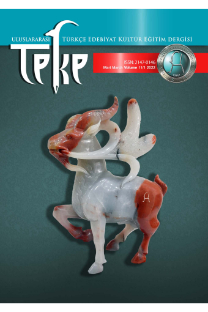Mental Fiil Kavramı ve Türkmen Türkçesinde Mental Fiiller
Mental süreçlerin ilk aşaması, algılama sürecidir. Algılama eyleminin görevi, çeşitli duyulardan gelen bilgileri beyindeki dil merkezlerine ulaştırmaktır. Dolayısıyla dil süreçlerinin işlevi algılamakla başlamaktadır. Dilin mental sürecinin ikinci aşaması, algıların anlamlandırılması ve yorumlanmasıdır. Yani çeşitli duyulardan gelen bilgiler işleme alınır. Bu aşamada beyinde kodlanmış bilgilerle, dışarıdan gelen bilgilerin bağlantıları kurulur, anlamlama süreci gerçekleşir. Bu süreçten sonra, tepki veya kendini ifade etme süreci başlar. Bu mental sürecin üçüncü ve son aşamadır.
Anahtar Kelimeler:
Mental Fiil, Zihin Fiilleri, Algılama Fiilleri, Duygu Fiilleri, Türkmen Türkçesi
Mental Verb Term and Mental Verbs in Turkmen Turkish
The first stage of the mental processes is acquisition. The duty of acquiring is to make the knowledge coming from different senses reach language centers in brain. So the function of language processes starts with acquisition. The second stage of the mental process of a language is commenting and understanding perceptions. That is, information coming from the different senses is put into operation. At this stage, connections of knowledge coming from outside and knowledge that is coded in brain and the stage of signification is realized. After this stage, the stage of reaction or self- expression starts. This is the third and the last stage of the mental process.
Keywords:
Mental Verb, Mind Verbs, Perception Verbs, Emotion Verbs, Turkmen Turkish,
___
- ARNAZAROV, S. (2004). Türkmen ve Türkiye Türkçesinin Ortak Fiillerinin Anlam Bakımından Genel Bir Mukayesesi. V. Uluslararası Türk Dil Kurultayı Bildirileri, (s. 193–219), Ankara
- ARKONAÇ, S. (2005). Psikoloji Zihin Süreçleri Bilimi. Ankara: Alfa Yayınları.
- BABU, N. (2009). Development of Theory of Mind and Mental State Language in Children. New Delhi-İndia: Concept Publishing Company.
- BAYLIYEV, H. (1981). Saylanan İşler. Aşgabat: Turkmenistan SSR Ilımlar Akademiyası, Ilım.
- LEVİN, B. (1993). English Verb Classes and Alternations. London: The University of Chicago Press.
- BİBER, D., Johansson S., Leech G., Conrad S. and Finegan E. (1999). Grammar of Spoken and Written English. Longman.
- BOOTH, J., H. W. S. (1995). Development of the Understanding of the Polysemous Meanings of the Mental State Verb Know. 10, Cognitive Development, October– December, 529-549.
- BOOTH, J. (1994). Role of the Cognitive Internal State Lexicion in Reading Comprehension. Journal of Educational Psychology. Vol 86, No. 3, 413-422.
- BRETHERTON, I. and BEEGHLY, M.(1982). Talking About Internal States: The Acquisition of an Explicit Theory of Mind. Developmental Psychology. 18, 906- 921.
- ERDEM, M. (2004). Türkmen Türkçesinde Mental Fiillerin İsteme Göre Anlam Değişmeleri. V. Uluslararası Türk Dil Kurultayı. (s. 939-949), Ankara
- FURROW, D., BRYANT, D. and MOORE, C. (1989). Mental Terms and the Development of Certainty. Child Development, Inc., 60, 167-171.
- GOATLY, A. (1997). The Languages of Methapors. London and New York.
- GÖDELEKLİ, K. (2011). Zihin Felsefesi. Eskişehir: Anadolu Üniversitesi Yayını: 2337
- HALLIDAY, M. A. K. (1990). An Introduction to Functional Grammar. London.
- HAMZAYEV, M. Y. (1962). Türkmen Diliniň Sözlügi. Aşgabat: Türkmenistan SSR İlimler Akademisi Neşriyatı.
- HUGHES, C. ve LEEKAM, S. (2004). What are the Links Beetween Theory of Mind and Social Relations? Review, Reflections and New Directions for Studies of Typical and Atypical Development. Social Development, Blackwell Publishing Ltd., 13, 59-619.
- İLAL, K. G. (1991). Tıpsal Psikoloji, Tıpta Davranış Bilimleri. (3.Baskı). Ankara: Güneş Kitabevi.
- JOHNSON, C. N. (1981). Acquisition of Mental Verbs and the Concept of the Mind. (ed. S. Kuczaj), Language Development: Vol 1 Syntax and Semantic, Hillside, NJ: Earlbaum: 455-478.
- JOHNSON, C. N. and WELLMAN H. M. (1980). Children’s Devoloping Understanding of Mental Verbs: Remember, Know and Guess. Child Development, Vol. 51, No. 4 (Dec., 1980), 1095-1102.
- JOHNSON, C. N. and MARATSOS M. P. (1977). Early Comprehension of Mental Verbs: Think and Know. Chid Development, 48, 1743-1747.
- KAMCHYBEKOVA, K. (2011). Kırgız Türkçesinde Duyu Fiilleri. ODÜ Sosyal Bilimler Enstitüsü Dergisi II, 3: 87-102.
- KARAAĞAÇ, G. (2008). Dil ve İnsan Oluş. Prof. Dr. Ahmet Bican Ercilasun Armağanı. (ed. Ekrem Arıkoğlu) içinde s. 149-161, Ankara
- KARAKUŞÇU, M. N. (1999). Genel Psikoloji ve Normal Davranışlar. Ankara: Pelin Ofset.
- KÖKNEL, Ö. (2003). Akıl ile Düşünce Gücü. İstanbul: Altın Kitaplar Yayınevi.
- KULIEV, G. K. (1998). Semantika Glagola v Tyukskih Yazıkah. Baku: ELM.
- LEVİN, B. (1993). English Verb Classes and Alternations. Chicago: University of Chicago Press.
- MOORE, C., FURROW, D., DAVIDGE, J. and CHIASSON, L. (1992). Mental Terms in Mothers’ and Children’s Speech: Similarities and Relationships. Jf. Child Language, 19, Britain: Printed in Great, 617-631.
- MORGAN, T. (1984). Psikolojiye Giriş. (çev. Sirel Karakaş), Ankara: Meteksan A. Ş.
- ÖMÜRALİEVA, S. (2001). Kırgız Tili. Leksika, Bişkek.
- RİCHARD, C. A. and Ernest R. H. (1999). Psikolojiye Giriş. (çev. Yavuz Alogan), Ankara: Arkadaş Yayınları.
- SARIYEV, B. (1998). Türkmencenin Grameri – Şekil Bilgisi. Ankara: Türk Dünyası Gençlerinin Yayın Birliği.
- SHATZ, M., WELLMAN, H. M. and SILBER, S. (1983). The acquisition of mental verbs: A systematic investigation of the first reference to mental state. University of Michigan, 14 Cognition, 301-321.
- TEKİN T., ÖLMEZ, M., CEYLAN E., ÖLMEZ Z. ve EKER, S. (1995). Türkmence Türkçe Sözlük. Ankara: Simurg Kitapçılık ve Yayıncılık.
- VESTER, F. (1997). Düşünmek, Öğrenmek, Unutmak. İstanbul: Arıtan Yayınevi.
- WELLMAN, H. M. and JOHNSON, C. N. (1979). Understanding Mental Processes. A Developmental Study of Remember and Forget. Child Development, 50, 79-88.
- YAYLAGÜL, Ö. (2005). Türk Runik Harfli Metinlerde Mental Fiiller. Modern Türklük Araştırmaları Dergisi, II (1), Ankara, 17-51.
- (2011). Türkiye Türkçesindeki Duygu Fiilleri. Modern Türklük Araştırmaları Dergisi, 7(4):100-111, E-yayın Tarihi: 22 Şubat 2011. İnternet Kaynakları
- www.tureng.com.tr (Erişim: 14.10.2012).
- ISSN: 2147-0146
- Yayın Aralığı: Yılda 4 Sayı
- Başlangıç: 2012
- Yayıncı: Cengiz Alyılmaz
Sayıdaki Diğer Makaleler
Prof. Dr. Mustafa Argunşah’ın “Dil ve Edebiyat Yazıları” İsimli Eseri Üzerine
Mental Fiil Kavramı ve Türkmen Türkçesinde Mental Fiiller
Azərbaycan Memarlığının Şah Əsərlərinin Durumu
Hunlardan Günümüze Yabancılara Türkçe Öğretimi
Harun ŞAHİN, Selma KAYA, Alaattin CEREN, Adem FIRAT, Musa YILMAZ, Ömer MADEN
Öğretim Yazılımlarının Farklı Aşamalarda Kullanımının Başarıya Etkisi: Dil Bilgisi Öğretimi Örneği
